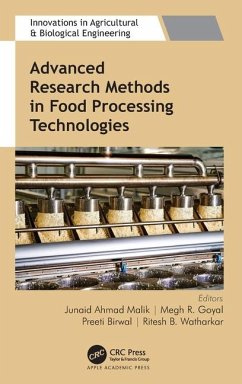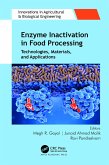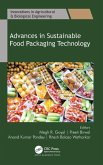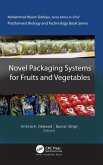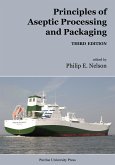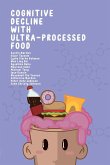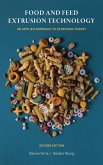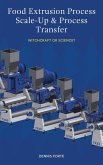Advanced Research Methods in Food Processing Technologies
Technology for Sustainable Food Production
Herausgeber: Malik, Junaid Ahmad; Birwal, Preeti; Goyal, Megh R.
Advanced Research Methods in Food Processing Technologies
Technology for Sustainable Food Production
Herausgeber: Malik, Junaid Ahmad; Birwal, Preeti; Goyal, Megh R.
- Gebundenes Buch
- Merkliste
- Auf die Merkliste
- Bewerten Bewerten
- Teilen
- Produkt teilen
- Produkterinnerung
- Produkterinnerung
Presents new research on advanced technologies for food processing, discussing cold plasma, ultrasound processing, thermosonication, microwave processing, high-pressure processing, electrospinning technology, encapsulation techniques, 3D food printing, ELISA in food authentication, nanotechnology in food processing, etc.
Andere Kunden interessierten sich auch für
![Enzyme Inactivation in Food Processing Enzyme Inactivation in Food Processing]() Enzyme Inactivation in Food Processing238,99 €
Enzyme Inactivation in Food Processing238,99 €![Advances in Sustainable Food Packaging Technology Advances in Sustainable Food Packaging Technology]() Advances in Sustainable Food Packaging Technology212,99 €
Advances in Sustainable Food Packaging Technology212,99 €![Novel Packaging Systems for Fruits and Vegetables Novel Packaging Systems for Fruits and Vegetables]() Novel Packaging Systems for Fruits and Vegetables203,99 €
Novel Packaging Systems for Fruits and Vegetables203,99 €![Principles of Aseptic Processing and Packaging Principles of Aseptic Processing and Packaging]() Philip E. NelsonPrinciples of Aseptic Processing and Packaging53,99 €
Philip E. NelsonPrinciples of Aseptic Processing and Packaging53,99 €![Cognitive Decline with Ultra-Processed Food Cognitive Decline with Ultra-Processed Food]() Austin MardonCognitive Decline with Ultra-Processed Food32,99 €
Austin MardonCognitive Decline with Ultra-Processed Food32,99 €![Food and Feed Extrusion Technology Food and Feed Extrusion Technology]() ForteFood and Feed Extrusion Technology209,99 €
ForteFood and Feed Extrusion Technology209,99 €![Food Extrusion Process Scale-Up and Process Transfer Food Extrusion Process Scale-Up and Process Transfer]() Dennis ForteFood Extrusion Process Scale-Up and Process Transfer220,99 €
Dennis ForteFood Extrusion Process Scale-Up and Process Transfer220,99 €-
-
-
Presents new research on advanced technologies for food processing, discussing cold plasma, ultrasound processing, thermosonication, microwave processing, high-pressure processing, electrospinning technology, encapsulation techniques, 3D food printing, ELISA in food authentication, nanotechnology in food processing, etc.
Produktdetails
- Produktdetails
- Verlag: Apple Academic Press
- Seitenzahl: 472
- Erscheinungstermin: 6. Februar 2024
- Englisch
- Abmessung: 240mm x 161mm x 30mm
- Gewicht: 869g
- ISBN-13: 9781774913482
- ISBN-10: 1774913488
- Artikelnr.: 69484485
- Herstellerkennzeichnung
- Libri GmbH
- Europaallee 1
- 36244 Bad Hersfeld
- gpsr@libri.de
- Verlag: Apple Academic Press
- Seitenzahl: 472
- Erscheinungstermin: 6. Februar 2024
- Englisch
- Abmessung: 240mm x 161mm x 30mm
- Gewicht: 869g
- ISBN-13: 9781774913482
- ISBN-10: 1774913488
- Artikelnr.: 69484485
- Herstellerkennzeichnung
- Libri GmbH
- Europaallee 1
- 36244 Bad Hersfeld
- gpsr@libri.de
Junaid Ahmad Malik, PhD, is a Lecturer with the Department of Zoology at Government Degree College, Bijbehara, Kashmir (J&K), India, and is actively involved with teaching and research activities. Dr. Malik has published research articles and technical papers in international peer-reviewed journals and has authored and edited books, book chapters, and popular editorial articles. He also serves as an editor and reviewer of several journals. He has participated in several state, national, and international conferences, seminars, workshops, and symposia. He is a life member of the Society for Bioinformatics and Biological Sciences. Megh R. Goyal, PhD, PE, is a Retired Professor in Agricultural and Biomedical Engineering from the General Engineering Department in the College of Engineering at the University of Puerto Rico-Mayaguez Campus. He was proclaimed as the "Father of Irrigation Engineering in Puerto Rico for the twentieth century" by the ASABE, Puerto Rico Section, for his pioneering work on micro irrigation, evapotranspiration, agroclimatology, and soil and water engineering. A prolific author and editor, he has written more than 200 journal articles and several textbooks and has edited over 100 books. Preeti Birwal, PhD, is a Scientist in the Department of Processing and Food Engineering at the College of Agricultural Engineering and Technology at Punjab Agricultural University, Ludhiana, Punjab, India. She served at Jain Deemed to be University, Bangalore, as a member of the board of examiners and placements. She has delivered lectures as a resource person on doubling farmers' income through dairy technology in training sponsored by the directorate of Extension, Ministry of Agriculture and Farmers Welfare, Government of India. She has published research papers, edited books, book chapters, popular articles, conference papers, abstracts, and editorial opinions. Ritesh Balaso Watharkar, PhD, is affiliated with the College of Management, Agri and Food Business Management, MIT-ADT University, Loni Kalbhor, Pune, Maharashtra, India. He was formerly Assistant Professor at Karunya Institute of Technology and Sciences and was also a senior visiting scholar under a UNESCO Great Wall China Fellowship Programme. He was Assistant Professor at K. K. Wagh Food Tech College and at Shramshakti College of Food Technology. He has published journal articles, popular articles, and several books.
PART I: COLD PLASMA AND ULTRASOUND PROCESSING OF FOODS 1. Introduction to
Food Processing Technologies 2. Applications of Cold Plasma Technology in
the Food Industry 3. Applications of Cold Plasma Technology in Food
Processing 4. Potential of Plasma Engineering for Decontamination in the
Food Industry 5. Impact of Cold Plasma on Physical Surface Modifications of
Foods and Food Products 6. Ultrasound Processing of Foods and Food
Products: An Overview 7. Potential of Ultrasound Technology in
Nutraceuticals and Pharmaceuticals 8. Principles of Ultrasonication
Processing in the Food Industry 9. Potential of Thermosonication Processing
in the Food Industry 10. Role of Ultrasound-Assisted Mechanical Shear Force
in Preservation of Foods PART II: MICROWAVE PROCESSING OF FOODS 11.
Applications of Microwave Technology in Food Processing 12. Potential of
Microwave Heating in Food Processing 13. Intermittent Microwave Drying of
Strawberry Fruits PART III: RESEARCH ADVANCES IN PROCESSING OF FOODS 14.
High-Pressure Processing of Foods and Food Products: An Overview 15.
Applications of Electrospinning Technology in Foods: An Overview 16.
Encapsulation Techniques and Their Applications in the Food Industry 17.
Impact of Freezing and Thawing Processes on Textural Properties of Food
Products 18. 3-D Printing of Foods: Concepts, Applications, and Prospects
19. Potential of Enzyme-Linked Immunosorbent Assay (ELISA) for Food
Authentication 20. Applications of Nanotechnology in Food Processing
Food Processing Technologies 2. Applications of Cold Plasma Technology in
the Food Industry 3. Applications of Cold Plasma Technology in Food
Processing 4. Potential of Plasma Engineering for Decontamination in the
Food Industry 5. Impact of Cold Plasma on Physical Surface Modifications of
Foods and Food Products 6. Ultrasound Processing of Foods and Food
Products: An Overview 7. Potential of Ultrasound Technology in
Nutraceuticals and Pharmaceuticals 8. Principles of Ultrasonication
Processing in the Food Industry 9. Potential of Thermosonication Processing
in the Food Industry 10. Role of Ultrasound-Assisted Mechanical Shear Force
in Preservation of Foods PART II: MICROWAVE PROCESSING OF FOODS 11.
Applications of Microwave Technology in Food Processing 12. Potential of
Microwave Heating in Food Processing 13. Intermittent Microwave Drying of
Strawberry Fruits PART III: RESEARCH ADVANCES IN PROCESSING OF FOODS 14.
High-Pressure Processing of Foods and Food Products: An Overview 15.
Applications of Electrospinning Technology in Foods: An Overview 16.
Encapsulation Techniques and Their Applications in the Food Industry 17.
Impact of Freezing and Thawing Processes on Textural Properties of Food
Products 18. 3-D Printing of Foods: Concepts, Applications, and Prospects
19. Potential of Enzyme-Linked Immunosorbent Assay (ELISA) for Food
Authentication 20. Applications of Nanotechnology in Food Processing
PART I: COLD PLASMA AND ULTRASOUND PROCESSING OF FOODS 1. Introduction to
Food Processing Technologies 2. Applications of Cold Plasma Technology in
the Food Industry 3. Applications of Cold Plasma Technology in Food
Processing 4. Potential of Plasma Engineering for Decontamination in the
Food Industry 5. Impact of Cold Plasma on Physical Surface Modifications of
Foods and Food Products 6. Ultrasound Processing of Foods and Food
Products: An Overview 7. Potential of Ultrasound Technology in
Nutraceuticals and Pharmaceuticals 8. Principles of Ultrasonication
Processing in the Food Industry 9. Potential of Thermosonication Processing
in the Food Industry 10. Role of Ultrasound-Assisted Mechanical Shear Force
in Preservation of Foods PART II: MICROWAVE PROCESSING OF FOODS 11.
Applications of Microwave Technology in Food Processing 12. Potential of
Microwave Heating in Food Processing 13. Intermittent Microwave Drying of
Strawberry Fruits PART III: RESEARCH ADVANCES IN PROCESSING OF FOODS 14.
High-Pressure Processing of Foods and Food Products: An Overview 15.
Applications of Electrospinning Technology in Foods: An Overview 16.
Encapsulation Techniques and Their Applications in the Food Industry 17.
Impact of Freezing and Thawing Processes on Textural Properties of Food
Products 18. 3-D Printing of Foods: Concepts, Applications, and Prospects
19. Potential of Enzyme-Linked Immunosorbent Assay (ELISA) for Food
Authentication 20. Applications of Nanotechnology in Food Processing
Food Processing Technologies 2. Applications of Cold Plasma Technology in
the Food Industry 3. Applications of Cold Plasma Technology in Food
Processing 4. Potential of Plasma Engineering for Decontamination in the
Food Industry 5. Impact of Cold Plasma on Physical Surface Modifications of
Foods and Food Products 6. Ultrasound Processing of Foods and Food
Products: An Overview 7. Potential of Ultrasound Technology in
Nutraceuticals and Pharmaceuticals 8. Principles of Ultrasonication
Processing in the Food Industry 9. Potential of Thermosonication Processing
in the Food Industry 10. Role of Ultrasound-Assisted Mechanical Shear Force
in Preservation of Foods PART II: MICROWAVE PROCESSING OF FOODS 11.
Applications of Microwave Technology in Food Processing 12. Potential of
Microwave Heating in Food Processing 13. Intermittent Microwave Drying of
Strawberry Fruits PART III: RESEARCH ADVANCES IN PROCESSING OF FOODS 14.
High-Pressure Processing of Foods and Food Products: An Overview 15.
Applications of Electrospinning Technology in Foods: An Overview 16.
Encapsulation Techniques and Their Applications in the Food Industry 17.
Impact of Freezing and Thawing Processes on Textural Properties of Food
Products 18. 3-D Printing of Foods: Concepts, Applications, and Prospects
19. Potential of Enzyme-Linked Immunosorbent Assay (ELISA) for Food
Authentication 20. Applications of Nanotechnology in Food Processing

